Academics at BLAIR ACADEMY
FOUNDED 1848 COME. STUDY. LEARN.

FOUNDED 1848 COME. STUDY. LEARN.



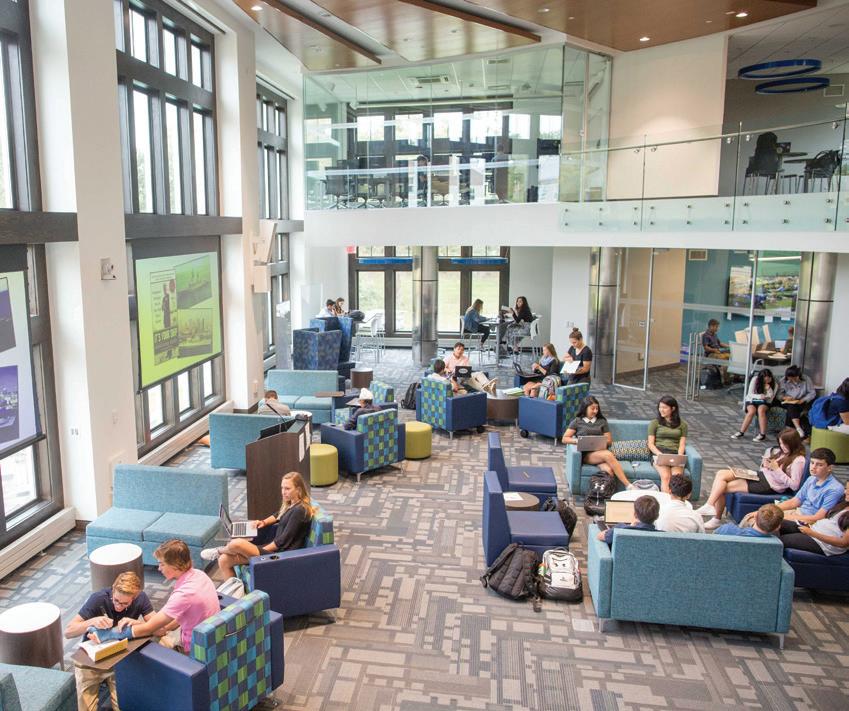
Our broad and varied curriculum includes introductory to advanced classes in nine different disciplines; thus, students at every level experience rigorous traditional coursework and explore exciting electives designed to help them develop the skills necessary for success in an ever-changing world.
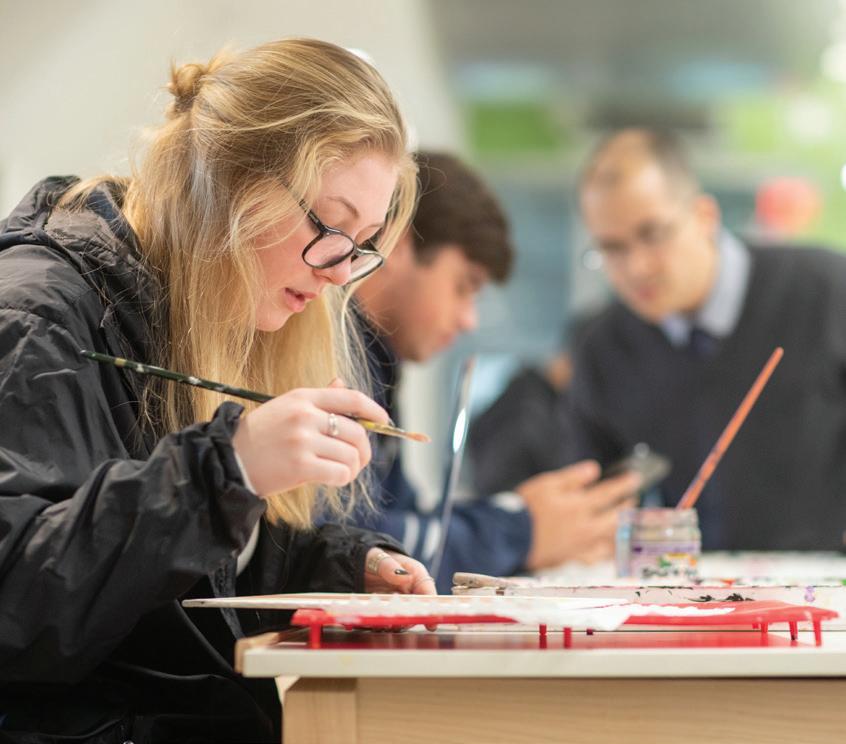

Learning at Blair is a demanding, creative and collaborative process, one that increasingly urges students to pursue their own academic interests and seek knowledge without limits. Interdisciplinary exploration of questions, problems and ideas inspires students to seek deeper understanding of a subject through reflection and analytical thought, while hard work and the mentorship of Blair’s faculty spark intellectual curiosity and lead to learning habits that last a lifetime.
We invite you to delve into our academic offerings in this publication and learn more on our website at www.blair.edu/academics
The academic year is divided into two semesters and a student receives 1.5 units of credit for the successful completion of a single-semester course and 3 units of credit for a successfully completed yearlong course.
The Blair diploma is granted to students whom the faculty and Head of School judge to be members in good standing of the School community and who have met the following requirements for graduation:
English: Minimum 4 years for a total of 12 units for a four-year student
Mathematics: Minimum 3 years (Algebra I, Geometry & Algebra II or their equivalents) for a total of 9 units for a four-year student
Languages: Minimum 2 years of one modern or classical language for a total of 6 units for a four-year student
Sciences: Minimum of 3 years in sciences (2 of which must be laboratory sciences, Biology & either Chemistry, Robotics or Physics) for a total of 9 units
History: Minimum of 2 years in United States History/Modern European History. In addition, four-year students must take Global Issues for a total of 9 units for a four-year student
Fine & Performing Arts: Minimum of three semesters of study for a four-year student
Religion & Philosophy: Minimum one semester of study
Ninth-Grade Program: 1.5 units for all 9th graders
Blair LEADS (Leadership Communications, Global Engagement, Self Awareness, Ethical Decision-making & Service): 1.5 units for all students in 10th grade
Students in the 11th or 12th grade wishing to take a course that the School does not offer or a course that does not fit their schedules may propose an independent study as a fifth or, in exceptional cases, a sixth course. Students select a faculty advisor with whom they work to create a written proposal. A student may undertake only one independent study per term.

The AP examination is required of all students enrolled in an AP course. Such courses end in either an examination or, in the case of the arts, a portfolio of work. The examination or portfolio is an integral part of an AP course and its final focus. Thus, the examination is required if a student is to receive credit and designation for an AP course.
For more details about our graduation requirements, please visit www.blair.edu/course-catalog
Blair’s English department teaches students to read closely and perceptively, write clearly and incisively, and speak confidently and effectively, while helping them acquire a familiarity with and appreciation for English, American and world literature. We emphasize the development and practice of rhetorical skills, social awareness and empathy that will serve students well throughout their lives.
Students write regularly about themselves, their communities, and the characters and ideas they encounter in literature. Bolstered by regular exploration of grammar and rhetoric, they construct and revise essays, short stories, poetry and, as part of our focus on public speaking, scripts for The Blair Leadership Stories
Project and the annual 10th- and 12th-grade public speaking contests. Twelfth-grade students may choose to spend the spring term in English 4 Capstone, which allows them to conceive, develop and present significant writing projects on topics of their choice.
Our reading lists provide grounding in important fundamental texts of the anglophone literary tradition and exposure to a diversity of voices, old and new. In the first three years, for example, all classes study Shakespeare and also more contemporary works. Recent English 4 electives have explored a range of narrower topics, including Homer’s The Odyssey, modern drama, the Harlem Renaissance, dystopian literature, and novels and the films they inspired.
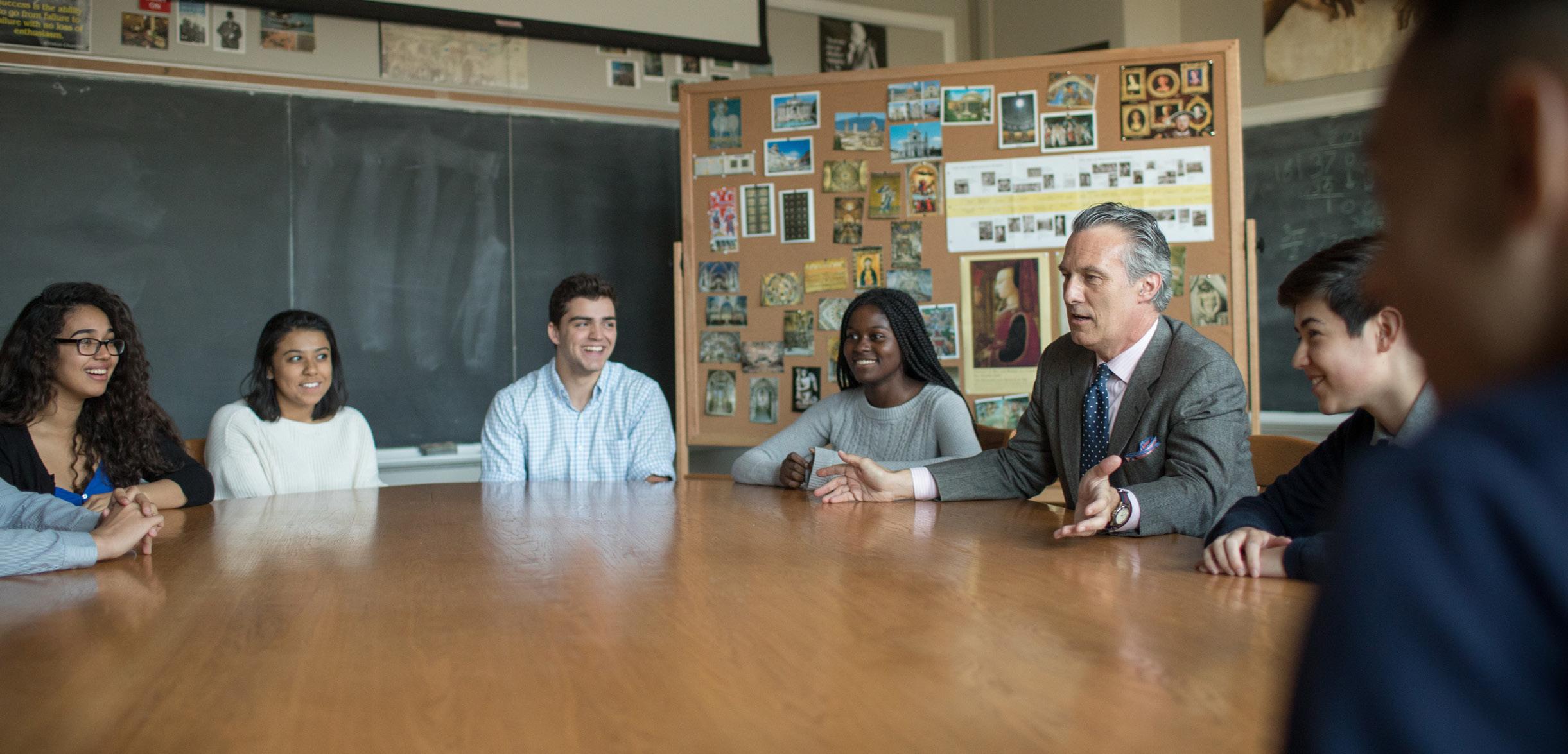
“
Developing an appreciation for literature and fictional characters helps us become thoughtful and engaged members of the global community who better understand and empathize with real people.”
JAMES MOORE • ENGLISH DEPARTMENT CHAIR
• English 1, 2 & 3
• English 3 AP English Literature
• English 4 Capstone
• English 4 AP English Literature
• English 4 AP English Language
– Horror
– Dystopian Literature
– The Meaning of Life
– Narrative Writing
– Three Shakespeare Plays
– Religious Themes in Modern Literature
– Women & Wit
• Filming Blair Leadership Stories in 9th & 11th grade
• Tenth- & 12th-grade public speaking contests
• Debate Team
• Book Club
• AP Literature critique & defense of Shakespeare essays
• Workshops with writers in residence

• All-school summer read

• Weekly student Chapel talks
• Weekly School Meeting announcements
• Literary magazine, Between the Lines
• Online student newspaper, The Oracle
• Blair yearbook, the ACTA
“Effective storytelling and the ability to convey your values are key leadership skills. Blair students hone these skills each year as they build relationships on campus and beyond. Our graduates are prepared to communicate effectively as they become the leaders of tomorrow.”
PETER G. CURRAN • HEAD OF SCHOOL
Beginning in ninth-grade Global Issues, students have an opportunity to explore three important regions in the developing world: Africa, Asia and the Middle East. The 10th-grade year focuses on Modern European History, with a special emphasis on the roots of the United States. The 11th-grade year continues this theme through courses in United States history. During 12th grade, history students may choose from a number of electives, including Economics and Intellectual History Honors.
In addition to the regular curriculum, the Society of Skeptics offers weekly lectures by a wide variety of speakers, including noted historians, authors, and business and educational leaders. Skeptics speakers have included: CNN’s Lou Dobbs, Columbia University history professor Eric Foner, Lafayette College professor of history Joshua Sanborn, George Mason University history professor Peter Mandaville, two former governors of New Jersey, chair of the 9/11 Commission Governor Thomas Kean and former U.S. ambassador to Vietnam Raymond Burghardt ’63.

“Blair students develop critical academic skills that lead to success at the college level, including reading comprehension, written expression, speaking, critical thinking and research skills.”
JASON BECK • HISTORY DEPARTMENT CHAIR
• Global Issues
• Modern European History
• U.S. History
• AP U.S. History
• AP European History
• Intellectual History Honors: Existentialism & Modern Thought
• AP Comparative Government/Politics
• 1968: A Year in Crisis
• History of Women’s Rights
• Race in America
• American Government: Constitutional Law
• AP Microeconomics
• AP Art History
• America at War:
• Weekly Society of Skeptics lectures
• Alumni Roundtable & Current Events Forums

• Master classes taught by Skeptics & Alumni speakers
• Diplomacy Club
• Student government
• Model United Nations
• Trips to Intelligence Squared debates
• Travel to the Washington Ideas Forum & other
& museums in New York City, Philadelphia & Washington, D.C.
• School break trips to Europe, Asia & Africa
• Young Republican & Young Democrat Clubs
• Blair in Kenya
Conflicts That Shaped a Nation
“
Our daughter immediately felt she belonged at Blair. The School offers a strong foundation for a lifetime of opportunity, mixing leadership and academic excellence within a value system that promotes kindness and decency, which is incredibly important in this day and age.”
BILL & KRISTY • PARENTS OF STUDENT FROM NORTH CAROLINA
lectures
The heart of mathematical thought starts at the intersection of logic and creativity. Blair math teachers create rigorous and reflective learning opportunities that teach students to build connections, explore patterns, craft arguments, reason logically, make creative leaps, discover fascinating conclusions, understand the world better and, ultimately, enjoy the intellectual struggle of a uniquely beautiful art form.
The objectives of all Blair math courses are to foster analytical and critical thinking and to allow students to understand and appreciate the beauty inherent in mathematics. Blair math courses also prepare students for success in mathematics at the university level and
create an awareness of the need for mathematical literacy in the modern economy. Our faculty articulate mathematical thinking clearly and accurately and use appropriate technology to support the goals of the department.
The departmental graduation requirements are Algebra 1, Geometry and Algebra 2, but virtually all students take at least one math course beyond the required sequence, with more than 95% of the 12thgrade class enrolled in one level of Calculus. The math department comprises 14 faculty members with an average teaching experience of 15 years.
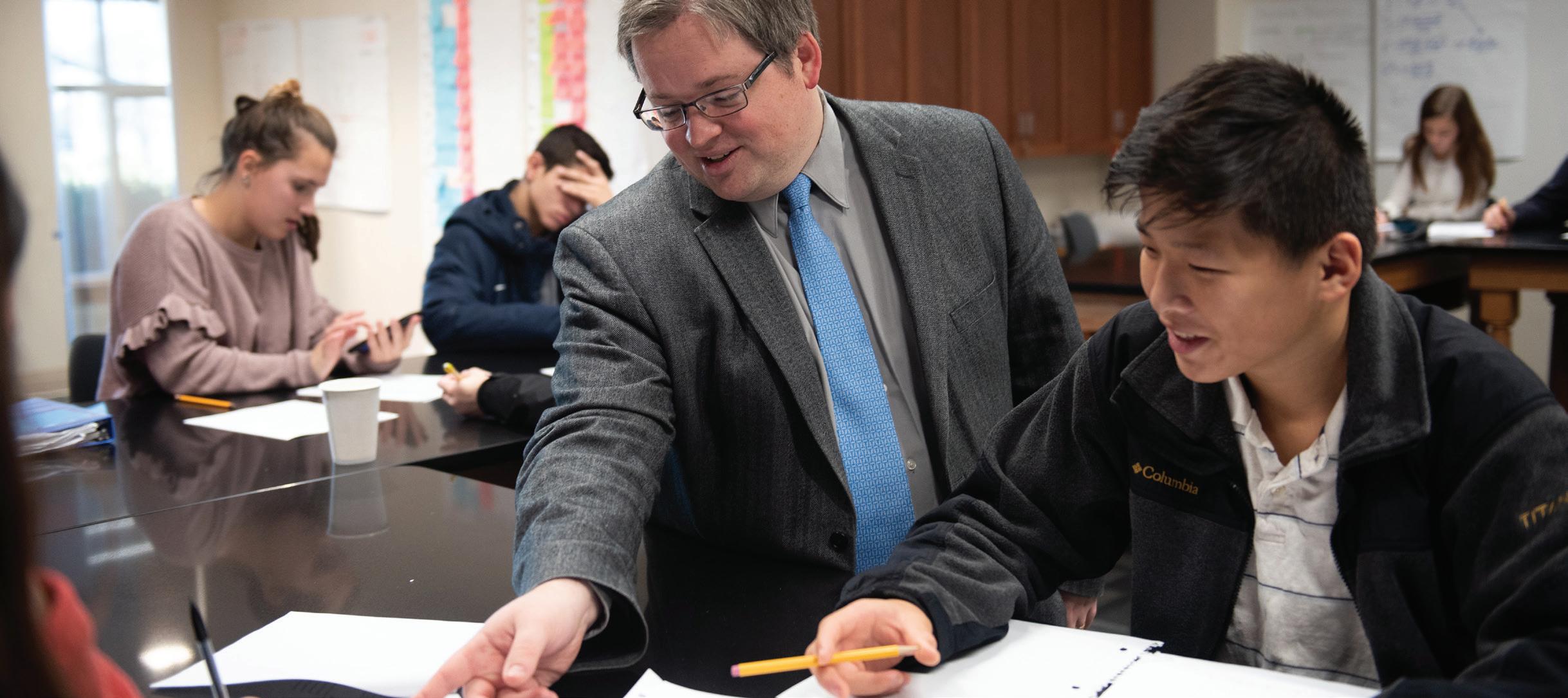
“Student mathematicians at Blair learn to speak math. Below the surface of each concept is a complex interplay of why and how, and our curriculum encourages students to dig into those deeper questions and to use them as a basis for communication, connection and collaboration.”
DANYELLE DOLDOORIAN • MATHEMATICS DEPARTMENT CHAIR
• Algebra 1
• Geometry
• Geometry Honors
• Algebra 2
• Algebra 2 Honors AB
• Algebra 2 Honors BC
• Mathematical Modeling & Applications
• Precalculus
• Precalculus Honors AB
• Precalculus Honors BC
• AP Calculus
• AP Calculus AB
• AP Calculus BC
• Advanced Statistics
• Multi-Variable Calculus
• Number Theory & Proofs
• Linear Algebra
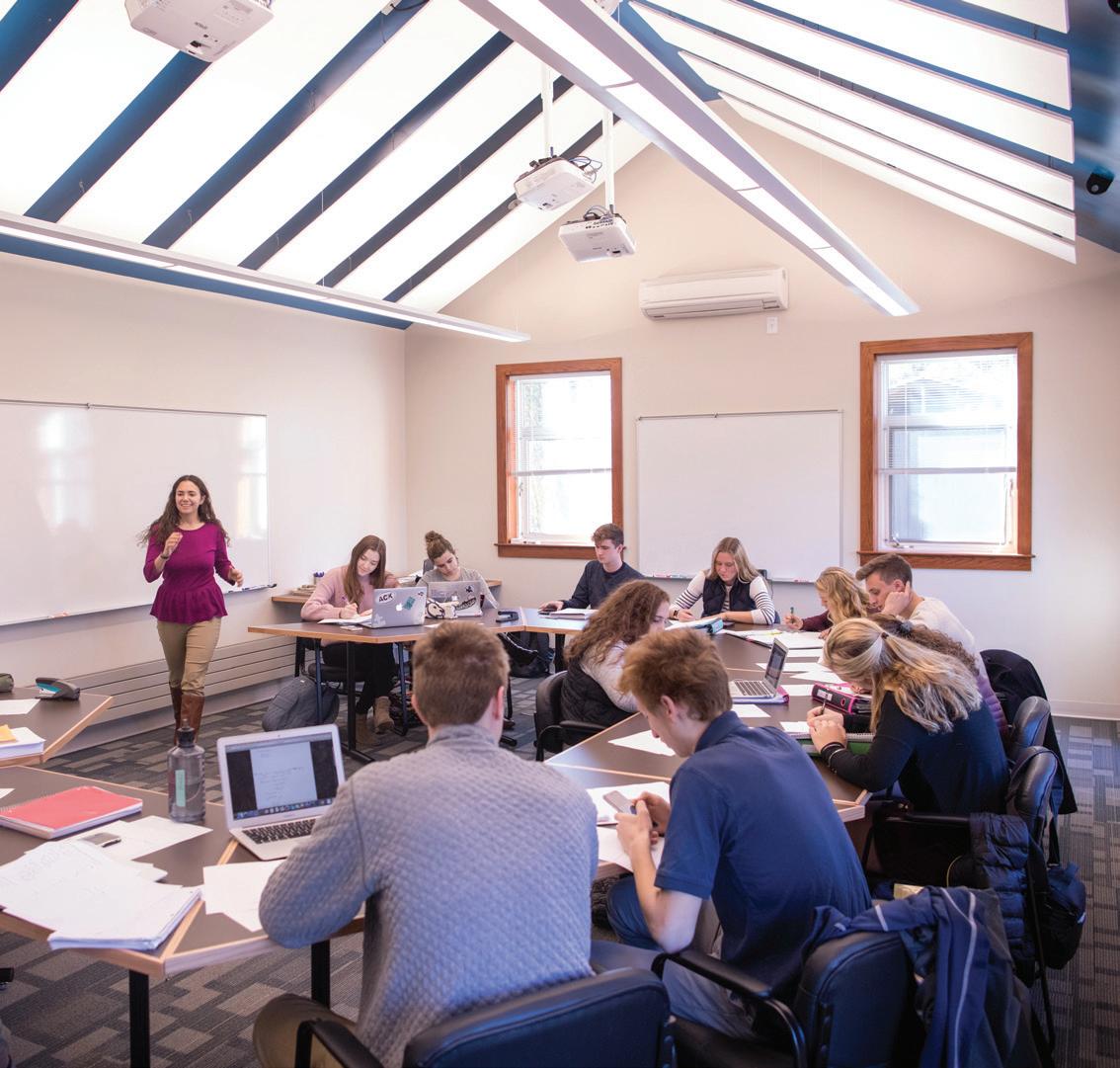
• Math Team
• American mathematics competitions

• Independent mathematics competitions
• Investment Club
• Peer Tutoring
• Women & Girls in STEM Club
“Our teachers could be working on Wall Street, in industry or doing research, but they choose to live and teach at Blair. Their care for students and their commitment to adolescent development in the classroom, on the field and in the dorms are extraordinary, and we feel it every day.”
APAAR • STUDENT FROM NEW YORK
Blair language classes support energetic interaction as students work with one another and their instructors to learn to speak, understand, read and write in Spanish, French, Chinese, and traditional Latin and Greek. In the modern languages, classroom immersion is key: Students pledge to speak only in the language they are studying for the duration of each class, a teaching tool that has become a hallmark of the language department’s philosophy.
Our modern-language teachers are all native speakers or near-native speakers, and our classics faculty focuses on the art of close reading, fully appreciating the
nuance of language and introducing students to the achievements of ancient literature. Connecting students to the broader cultural context of the languages Blair teaches is paramount. Beyond the classroom, students have the opportunity to travel outside of the United States to countries such as Costa Rica, Cuba and Italy—once-in-a-lifetime trips during which they immerse in other cultures, meet local leaders and visit ancient ruins. Closer to home, faculty and students regularly engage with members of Spanish- and Chinese-speaking communities in towns and cities within driving distance of campus.

“ Our curriculum encourages students to develop a competent grasp of language and exposes them to a variety of cultural material, both historical and current.”
JOYCE LANG • LANGUAGE DEPARTMENT CHAIR
• Spanish 1, 2, 3 & 4
• Spanish 2, 3 & 4 Honors
• Spanish Literature & Conversation Honors
• AP Spanish Language & Culture
• French 1, 2, 3 & 4
• French 3 & 4 Honors
• AP French Language & Culture
• Chinese 1, 2, 3 & 4
• Chinese 3 & 4 Honors
• AP Chinese Language & Culture

• Latin 1, 2 & 3
• AP Latin
• Ancient Greek
• Ancient History: Greece & Rome
• Spring & summer break trips to Spain, Central & South America, Italy, Greece, France, China & Canada
• Blair International Awareness Club (BIAC)
• Annual International Weekend festivities
• American Sign Language Club
• La Conexión
• Trips to New York City’s Chinatown
• Classics trip to Rome & other iconic destinations
“Blair was a game changer for our son. To say that he came out of his shell is an understatement. His confidence, as well as his oral and written communication skills, expanded significantly, making him well prepared for college and beyond.”
MARK & MARGOT • PARENTS OF STUDENT FROM CONNECTICUT
Students gain an understanding of the techniques and processes for gathering and analyzing evidence to support common scientific theories in Blair’s science classes. Our traditional courses in Biology, Chemistry and Physics stress this extensively. As students move through grade levels and respective coursework, expectations increase, and students enrolled in Advanced Placement Biology, Chemistry or Physics courses are expected to display a significant level of confidence and comfort in the lab environment.
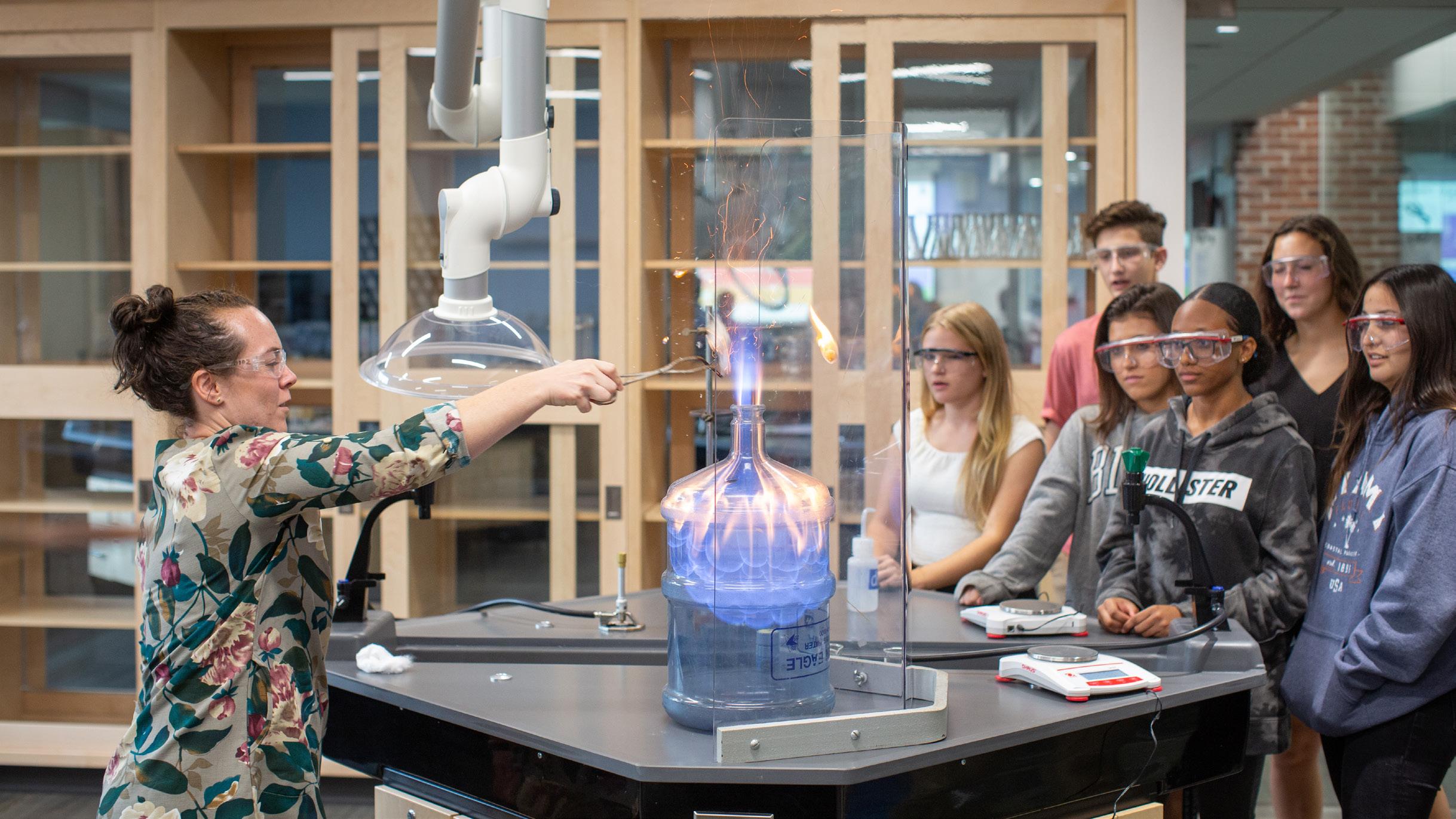
The department’s goal is to foster in students a strong interest in and genuine enthusiasm for applying
their scientific knowledge to everyday phenomena in the world around them, especially to parts of the world about which they are most curious. Within our curriculum, students have the opportunity to explore their interests by enrolling in courses such as AP Psychology, Marine Biology, Anatomy and Physiology, Engineering, Astronomy, Environmental Science, Analytical Chemistry, Robotics and Integrated Science Research. Designed by our teaching faculty, all of these courses aim to appeal to the varied science interests of Blair students.
“Laboratory and fieldwork enhance learning, foster excitement for the subject matter and reinforce understanding of complex scientific topics.”
KELLY HADDEN • SCIENCE DEPARTMENT CHAIR
• Biology
• Biology Honors
• Foundations of Integrated Science Research
• Integrated Science Research
• Chemistry
• Chemistry Honors
• Robotics
• Physics
• Physics Honors
• Environmental Science
• Marine Science
• Astronomy
• Biochemistry Honors
• Biomechanics
• Applied Psychology
• Engineering Science
• Anatomy & Physiology Honors
• AP Psychology
• AP Biology
• AP Chemistry
• AP Physics C: Mechanics
• AP Physics C: Electricity & Magnetism
• Research Fellows Program

• Earthshine Club
• Integrated Science Research

• Marine Science class trip to the Jersey shore
• Annual Science Expo
• Robotics Team
• Rutgers University Oncology Olympiad
• Chemistry Club
• Evening astrology sessions & summer minisessions
“My parents continuously praise how well my teachers, and especially my advisor, know me. While faculty members are obviously here to teach us and to help us grow as people, they really are on your side, eager to help you with any struggle, inside or outside the classroom.”
CLARA • STUDENT FROM SOUTH CAROLINA
From introductory to advanced, Blair art course offerings include everything from painting and drawing (including mechanical and architectural) to ceramics, graphic design, print-making and art history. For those who want to pursue art beyond Blair, the fine arts department offers a unique course designed to allow students to develop a comprehensive portfolio. Fine arts students regularly bring their ideas to life using the digital designand-fabrication tools in Blair’s maker space, and the department encourages student artists to incorporate multimedia into project work of every kind.
Blair art teachers are passionate artists. They not only teach the arts, they also live the arts through their own work. Our teachers share their love for the arts and professional experience with their students. Many students—even those who do not intend to pursue degrees in the arts—continue to take art classes in college and beyond, developing a talent discovered in Blair art classes. In addition, student filmmakers and photographers capture the life of the school community in creative and inspiring projects that focus on academics, the arts, athletics and other aspects of campus life.

“Blair’s vibrant arts program inspires students to participate at every level and prepares them to become true artists.”
KATE SYKES • FINE ARTS DEPARTMENT CHAIR
• Two-Dimensional Art 1 & 2
• Advanced Drawing
• Advanced Painting
• Photography 1
• Digital Photography
• Advanced Analog Photography
• Advanced Digital Photography
• Art Portfolio
• Graphic Design
• Advanced Graphic Design
• Architecture 1 & 2
• Introduction to Film Production
• Advanced Film Production
• Meaning & Media
• Art for Social Change
• Functional Design
• Ceramics 1 & 2
• Advanced Ceramics
• Sculpture/Ceramics
• AP Art History 1: Survey of Art History
• AP Studio Art Portfolio
• Independent Study in Art
• State-of-the-art ceramics room
• Blair Art Stars
• Trips to art venues in New York City & Philadelphia
• Trips to iconic art destinations in Europe during School breaks
• Student art critiques
• Professional art exhibitions in the Romano Gallery
• Master classes with visiting professional artists
• “Empty Bowls” project
• Off-campus art shows
• Opportunities to display artwork throughout campus, including the Romano Gallery


• Photography Club
• Annual Student Film Festival
• Opportunities to create videos for class councils & more
Computer science connects theory and practice, combining mathematics, programming and engineering. Students taking computer science classes are encouraged to think in both abstract and concrete terms, and faculty encourage students to develop technical aptitudes that will serve them well as they transition into college. Emphasis is placed on projectbased learning, with hands-on work dominating class time.
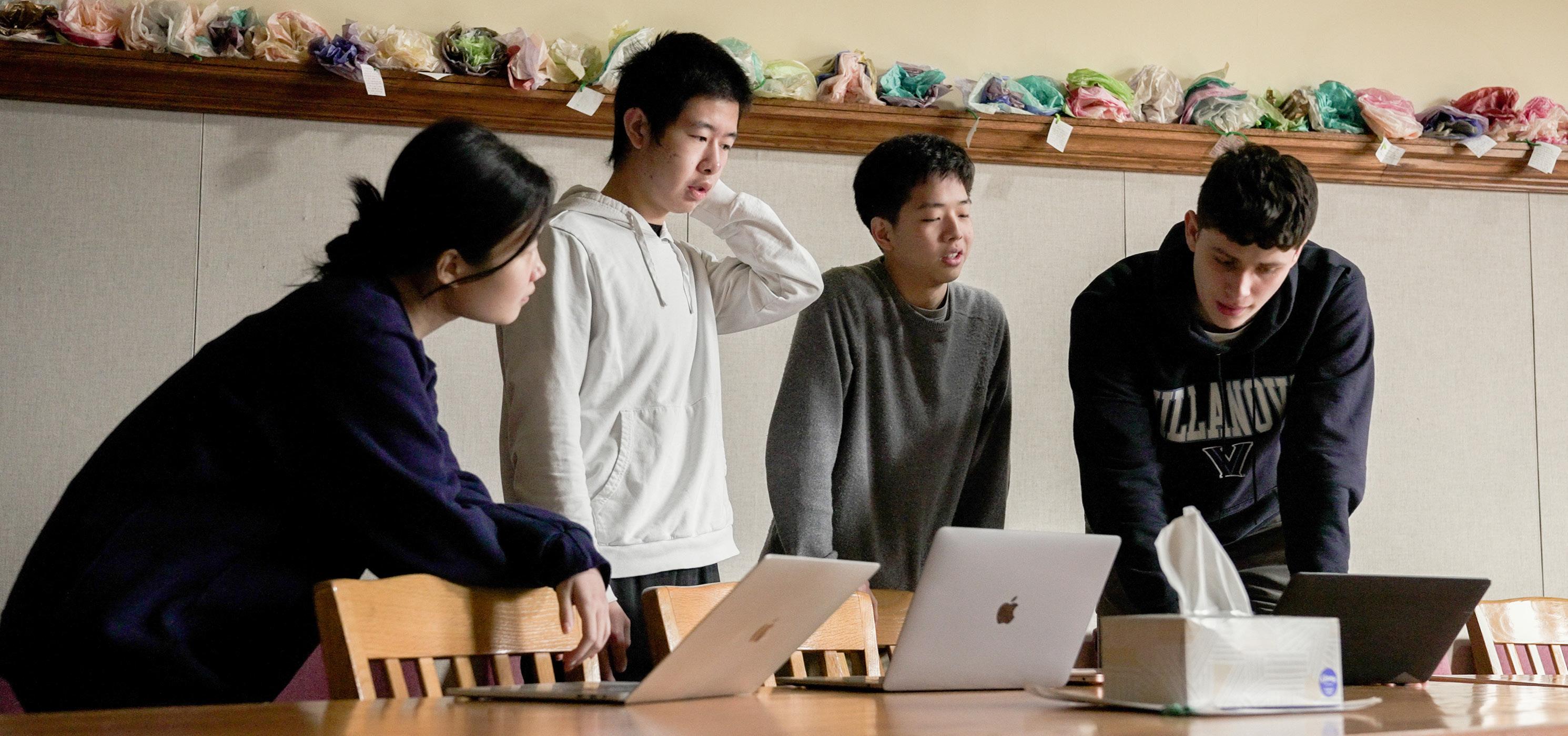
Students taking our multilevel programming course use the Python programming language to complete projects that emphasize all aspects of computational thinking. In addition to developing fundamental skills, students develop new areas of interest and a deeper understanding of the real-world connections
of their work. Our AP Computer Science course closely follows the Advanced Placement curriculum, exploring the type of material and concepts a student might expect in a first-year college course. Students gain a working familiarity with the Java programming language and study concepts that apply more generally to all programming languages.
Robotics integrates programming concepts with physical mechanisms such as motors and sensors. Students study both the hardware and software aspects of robotics and build working robots that perform complex tasks. Software design brings programming concepts to students in very real and practical ways as they create working real-world applications.
“ We focus on modern computer science, including underlying theory, knowledge and skills that transcend specific and ever-changing technologies.”
SAMUEL G. ADAMS IV • DIRECTOR OF TECHNOLOGY & COMPUTER SCIENCE DEPARTMENT CHAIR
• Robotics
• AP Computer Science
• Post-AP Computer Projects
• Introduction to Programming
• Software Design
• Advanced Software Design
• Artificial Intelligence
• Real-World Robotics

• Competitive Robotics Team
• State-of-the-art technology in Bogle Science Center

• State-of-the-art technology in the Chiang-Elghanayan Center for Innovation & Collaboration
• Open use of Blair’s maker space
• Blair Girls Who Code Club
• EdAccess Technology & Education Conference
• Independent study projects
• Ninth-Grade Program
• Maker space digital design & fabrication
• Headmasters’ Societies Games maker space projects
• Real-World Robotics Seminar
• Hands-on introduction to Da Vinci© Surgical System
• Girls Go CyberStart National Championship
IGNACIO • STUDENT FROM SPAIN
“Blair teachers care about more than your grades; they want to make sure you are happy and successful here. Their support gives students confidence and teaches us how to be independent.”
At Blair, art is not just a creative outlet, but also an ingrained part of the curriculum and the academic day. Our theatre, vocal and instrumental music groups perform broad repertoires that challenge students technically and conceptually; Blair performing artists range from the inexperienced-but-curious beginner to the tried-and-talented old hand who has performed for years.
The Blair Academy Players entertain the Blair community with three major productions each year
(including a musical), and our outstanding music department boasts a Symphony Orchestra, the Blair Academy Singers and Chamber Choir, as well as a host of smaller musical ensembles. In addition to performing at seasonal concerts in Armstrong-Hipkins Center for the Arts and collaborating with groups from other prep schools across the Northeast, the Blair Academy Symphony Orchestra and Singers have performed in New York City, Los Angeles, San Francisco, San Diego, Vienna, Salzburg, Prague, Budapest, and throughout Italy and the United Kingdom.

“Students learn by doing, whether they are working out the tricky fingering for a Bach string piece or handling a complicated phrase from an Aeschylus monologue.”
JENNIFER PAGOTTO • PERFORMING ARTS DEPARTMENT CHAIR
• Theatre 1 & 2
• Theatre 3: The Theatrical Self
• Improv
• AP Music Theory
• Digital Music
• Advanced Digital Music
• Independent Study in Music
• Blair Academy Singers
• Chamber Choir
• Religious Roots in Choral Music
• Religious Roots in Orchestral Music
• Symphony Orchestra
• Chamber Orchestra
• Jazz Ensemble
• Chamber Ensemble
• Three theatrical productions a year, including at least one musical

• Student-run A Cappella group
• At least five concerts on campus each year
• Solo recital each spring
• Annual Bartow Series performances featuring internationally renowned performers
• Student composers/arrangers featured at Blair music concerts
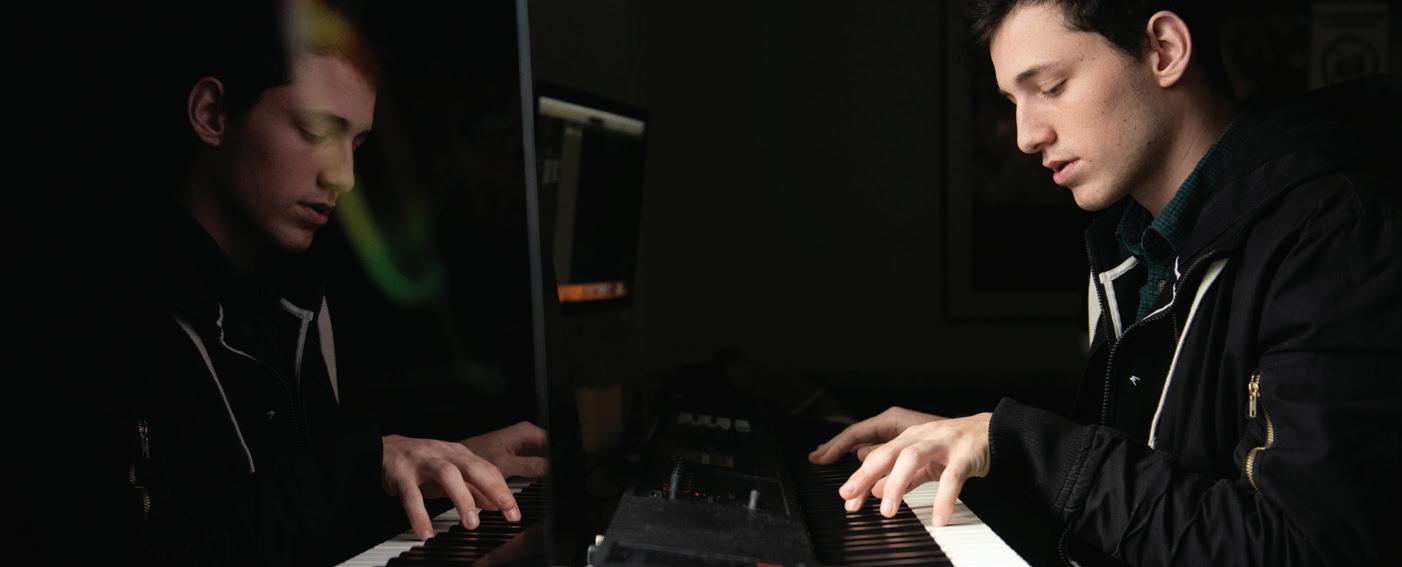
• Private lessons
• Spring break performance tours across the United States, United Kingdom, Italy, France & Austria
• Master classes with visiting professional musicians & actors as part of endowed Bartow Series
• Trips into New York City to attend concerts & Broadway shows
• Blair Academy Dancers & Dance Company
Blair’s religion and philosophy courses are designed with the goal of educating the whole student—mind, body and spirit. To this end, students may select from a variety of one-semester courses that span a wide range of unique academic topics and inquiries. Except for postgraduates, all students at the School are required to take one of these courses during their time at Blair.
While academically rigorous, religion and philosophy courses involve assessments that cover a breadth of styles and allow students to reflect very personally on significant life issues. The curriculum presumes no creedal commitments and endorses no

• Human Rights
• Introduction to Ethics: The Art of Living
• World Religions: Visions of Transformation
• Art for Social Change
• Meaning & Media
• Mindful Living
• Finding God
particular religious or philosophical stance. Generally speaking, our course offerings seek to teach students material that is provocative and challenging, even while it is potentially encouraging and grounding as we study the most influential voices in philosophical and religious history.
Finding ways to express our individual understanding of the world to invite conversation rather than foster antagonism is a singular goal of the department, as is promoting healthful practices of mind, body and spirit. This includes coordinating with Wednesday Chapels when appropriate to introduce traditions from among the student body.
• Wednesday Chapel
• Christian Fellowship
• Jewish Student Union
• Perspectives Club
• Philosophy Club
• Service Corps
• Interfaith Council
• Healthy Relationships Committee
• Christmas Vespers
• Annual service trips to destinations such as St. Jude Children's Hospital in Memphis
“Studying religion and philosophy challenges students to deepen their sense of self and their commitment to the well-being of others in the world through a variety of options meant to meet students where they are in their particular personal and intellectual journey.”
NATHAN MOLTENI • DEAN OF ACADEMICS
Blair is a midsize school of 465 students, giving us a small-school feel, while at the same time, offering big-school academic, athletic and arts programs. Learning extends far beyond the classroom on our hilltop campus as our signature programs broaden students’ horizons, introducing them to new ideas and teaching them critical leadership and communications skills that will give them a competitive advantage in college and in life.
The dual-advisor system is a foundational element of relationshipbased learning at Blair. Students are known and supported by two faculty mentors: an assigned academic monitor and a faculty member of their own choosing, who serves as their advisor. The advisor-advisee relationship is often the most influential one a student develops at Blair, and monitors play an essential role in Blair’s feedback loop about students’ accomplishments and challenges. Should the need for academic support arise, advisors and monitors work together to guide students to one of Blair’s many resources, including our director of academic support, school counselors and peer tutors.

Blair’s Integrated Science Research (ISR) program offers scientifically motivated students an opportunity to closely examine and contribute to the resolution of real-world challenges. As part of this curricular program, students delve into scientific writing, explore current industry research, learn how to connect with mentors, and design and execute research experiments, all under the guidance of Blair science faculty members who are experienced researchers. The enlarged and fully renovated Bogle Science Center includes dedicated laboratory space for independent research, giving students a fully equipped platform from which to engage in meaningful, long-term projects.
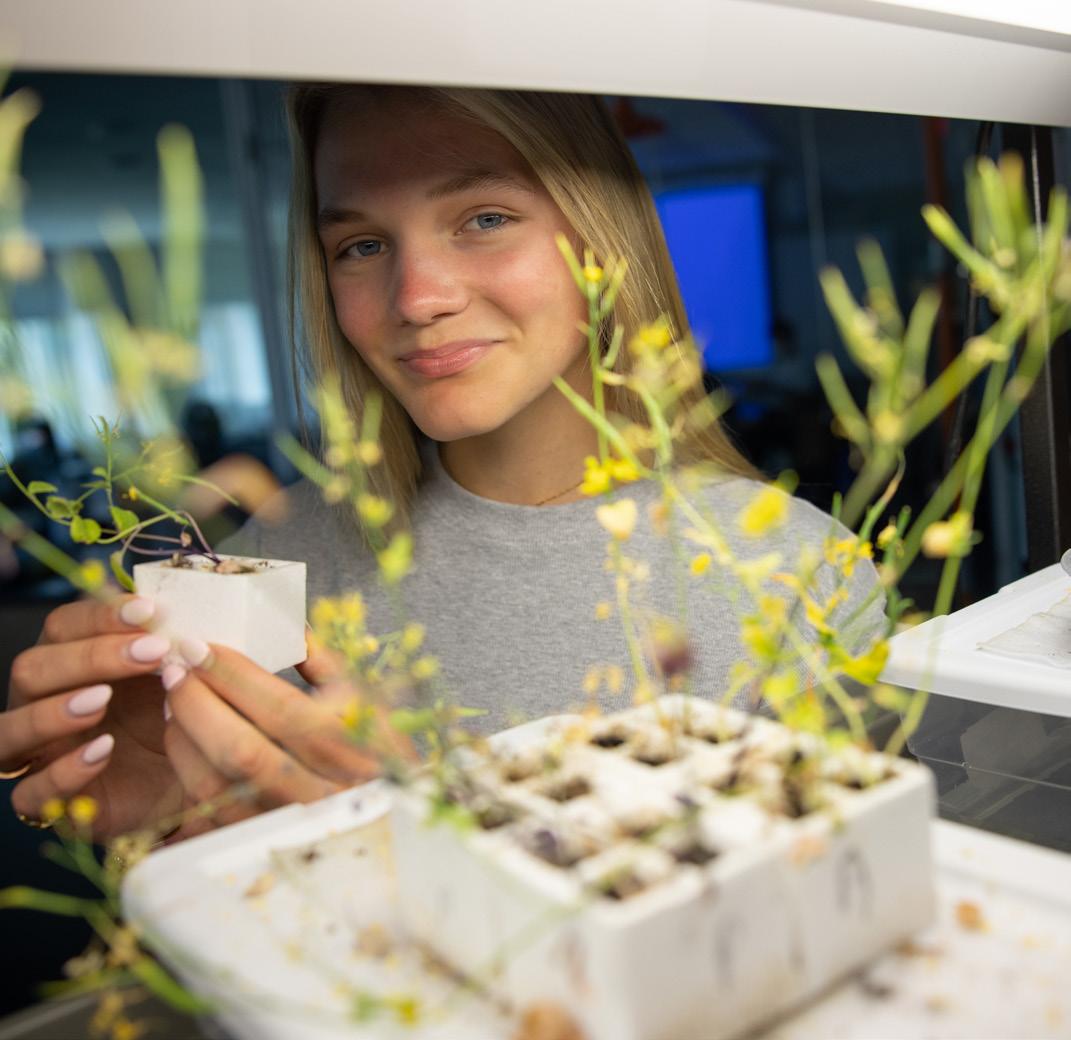
“Blair students are not only prepared for college, they are ready to navigate the challenges they will inevitably face in our ever-changing, 24/7 world.”PETER G. CURRAN • HEAD OF SCHOOL
Students and faculty debate important global issues in this unique forum that has grown to become a premier high-school lecture series. Speakers of myriad backgrounds come to campus to share their unique perspectives with students, who are encouraged to engage with presenters, ask questions and debate points of view. Tuesday-evening presentations often extend into Wednesday as students and teachers continue to debate salient issues in classrooms and dormitories. By participating regularly in the program, students demonstrate that they can direct their own learning, engage with the world beyond Blair, and place what they are learning in the classroom into a larger global context.
Every ninth grader takes a yearlong seminar designed to build connections and baseline skills that will help them succeed throughout their Blair careers. The seminar is specially crafted for first-year students and includes two half-year modules: health and wellness and design-and-maker-space training.
An important part of the first module is the Neuroteach Global Student Learning program, which emphasizes neurosciencebacked strategies for key aspects of learning, such as note-taking, study skills and reading retention. All ninth-grade students have access to the program and complete it independently over the course of their first year at Blair. Overseen by the fine arts and computer science departments, the design-and-prototyping module takes place in Blair’s cutting-edge ChiangElghanayan Center for Innovation and Collaboration. Teaching students to understand the process of digital design and fabrication, this portion of the program encourages students to apply that knowledge across their classes and in every aspect of their Blair experience.

Supporting students’ physical, mental, spiritual and emotional health remains a top priority at Blair, and students acquire skills that support their well-being through a wide range of offerings. In addition to providing healthful dining options and robust counseling and support resources, Blair builds a solid base for students with two years of health-and-wellness education. During the ninth-grade program, students practice essential skills such as conflict resolution, delivering and accepting apologies, and decoding hidden media messages. These discussion-based classes also delve into topics such as sleep, stress, mental and sexual health, and substance use. Tenth-grade LEADS classes build on the curriculum, encouraging critical thinking about themes of identity, development, values, leadership and more. Peer-led presentations hosted by our “Be Well @ Blair” student organization ensure that defined topics like mindfulness and spiritual health continue to be a community focus. With the support of the School’s Health Center team, chaplain, Dean of Equity, Inclusion and Belonging, consulting nutritionists and three full-time counselors—who will soon be housed in a state-of-the-art new facility—Blair students learn to prioritize health and well-being.
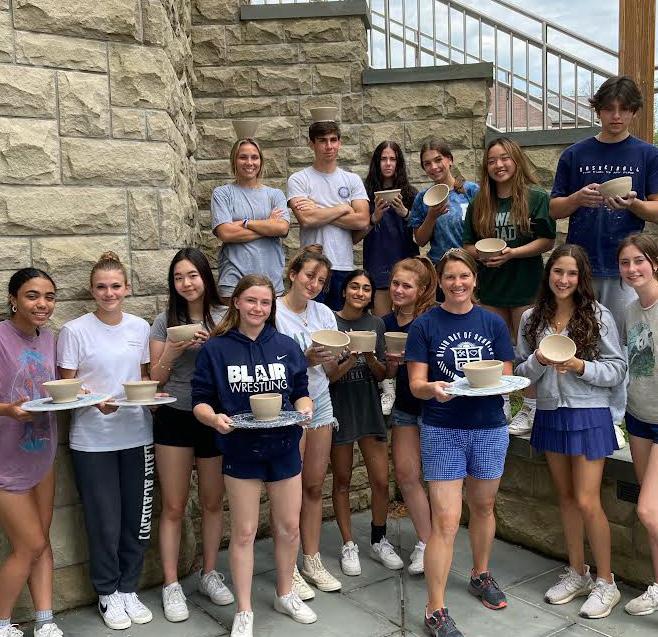
Through partnerships with area nonprofits, Blair students have become leaders and change agents in our local community. Our annual Day of Service, which puts hundreds of Blair volunteers to work for local causes, is our most visible effort, yet service at Blair often takes many forms. Campus clubs such as Earthshine, La Conexión and Anonymous Hope lead service efforts throughout the year. Notably, students and teachers invest the time to research an organization’s needs and brainstorm effective service work before diving in, helping students see that even small actions can make a big difference.
At Blair, teaching the art of effective communication is among our highest priorities. Our cross-curricular communication initiative and myriad public speaking opportunities prepare students to express their ideas, advocate for themselves, and engage with others in ways that build vital relationships and lead to success in life. As they collaborate in small or large groups, our students learn the value of teamwork, problem solving, and articulating their beliefs and passions. Building strong relationships requires effective communication, and mastering these skills before entering college puts our students a step ahead of their peers when they enter the worlds of higher education and professional life.
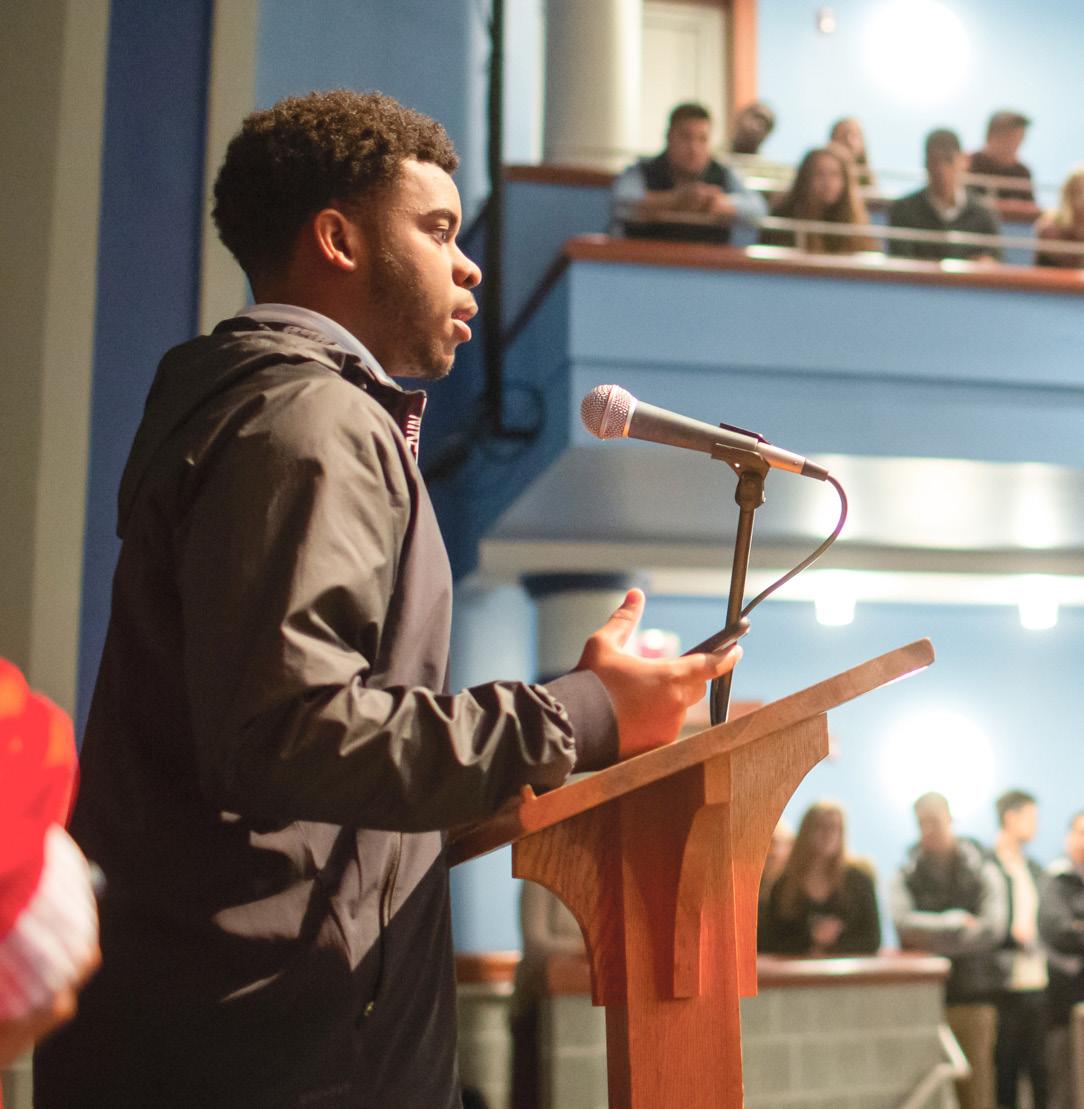
Through The Blair Leadership Stories Project, students develop their storytelling ability by crafting and sharing, on video, a compelling personal narrative. Participation in the project teaches students to concisely and confidently tell a story as they reflect on a challenge they have resolved while staying true to their beliefs. Students film stories during their first and third years at Blair, benchmarking their progress as effective communicators.
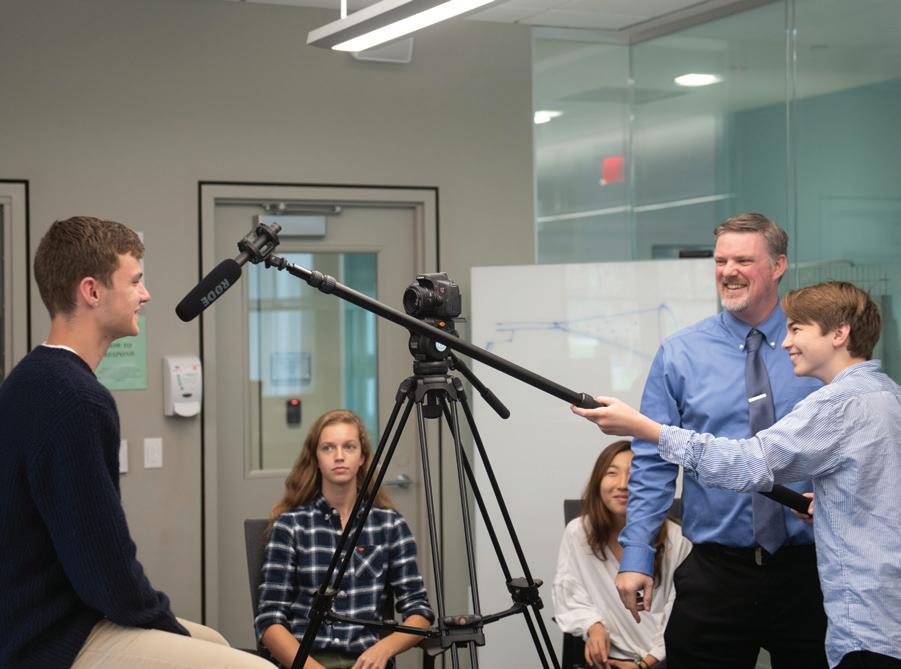

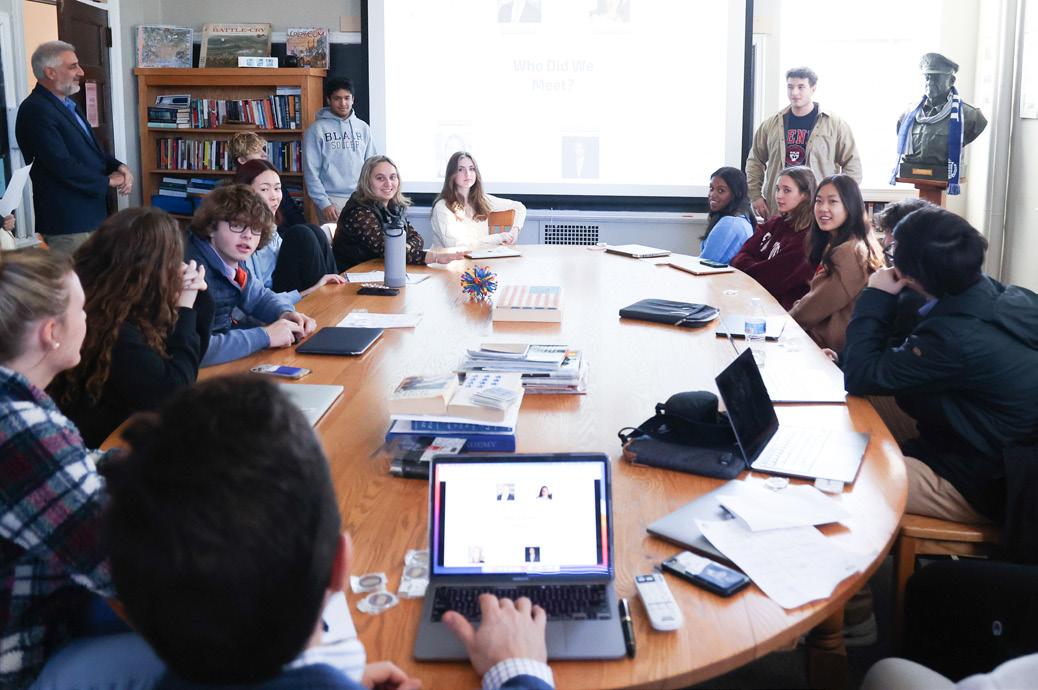
At Blair, historically, we have created travel programs with the help of faculty connections in places such as Kenya, France, Cuba, Canada, Costa Rica, Nicaragua, China and Haiti. As we emerge from pandemic-related travel restrictions and lean into the recent development of virtual connections with people in remote places, we are poised to expand the ways in which our students experience the world from new perspectives. Our intensive J-term program, which includes associated travel in some courses, our triennial orchestra trip and our senior spring project opportunities open the door for students to develop crucial intercultural learning skills both on and off campus, in classrooms as well as in a variety of locations that range from right around the corner to as far flung as South America, Europe and Africa.
Each January, our J-term gives students a chance to learn about a fascinating array of topics not usually covered in our standard curriculum. Students enroll in one of nearly 40 unique, facultydesigned minicourses, where they meet and interact with peers of every grade level both on and off campus. In these small-group settings, participants experience the pure joy of learning as they delve into topics that pique their interest.
In today’s rapidly changing college landscape, Blair’s college counseling team is focused on one goal: helping our students identify their own goals and interests so that they make confident decisions with their families about the college or university that will fit them best. To do that, Blair’s counselors work one-on-one with students, getting to know them well and giving them the tools and information needed to successfully navigate the next steps in their educational journeys.
In addition to becoming well-versed in all the classes, activities and passions that engage our students,
Blair’s college counselors support students and families through a wide range of offerings:

• An annual kickoff event in which the deans of prominent colleges and universities visit Blair to talk to students and families. In 2023, the panel of deans included Fordham University, Lafayette College and Princeton University.
• Weekly virtual coffee chats for parents and families, covering topics such as making the most of college visits, Blair’s “fit-first” approach, understanding athletic recruitment and paying for college.
“Blair college counseling is committed to our mission: to guide every student to be strategic and authentic in crafting competitive and compelling applications to a balanced list of best-fit schools.”
NIKI APPLEBAUM '01 • DEAN OF COLLEGE COUNSELING
• A college counseling class for juniors, with each section co-taught by two members of the counseling team.
• One-on-one sessions with counselors to review students’ applications and essays and receive tailored advice on all steps in the college process.
• In-person college visits and fairs throughout the year that welcome representatives from more than 100 institutions and offer them the opportunity to meet face-to-face with students.
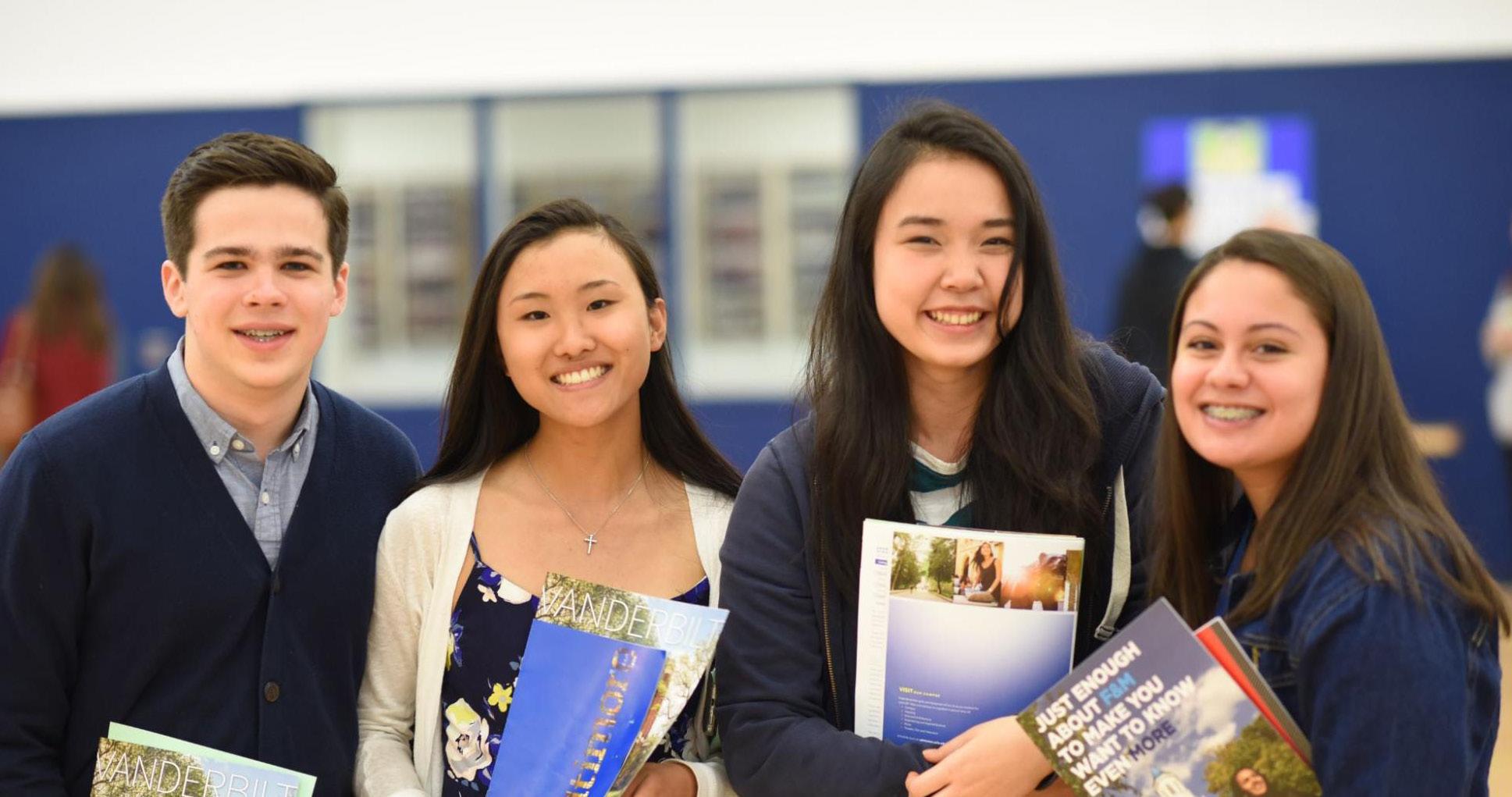
• Planned trips for small groups of students to area colleges and universities such as Rutgers University, Lehigh University, Princeton University and New York University. At each institution, students take a tour, meet an admission representative and, often, spend time with a Blair alum currently at the school–giving them a comprehensive look at what their lives may look like in the future.
• The Blair Bridges advisory board, which brings together college professionals from a wide array of
prestigious, post-secondary schools—state flagship universities, single-gender colleges, historically black colleges and universities, urban private research institutions, highly selective schools and less selective schools—to have conversations about their university’s practices to guide our programs at Blair. In addition to an annual summit, which takes place on campus, the Bridges advisory board meets regularly, helping Blair keep its finger on the pulse of what’s happening in higher education.
At Blair, the college counseling experience is deeply personalized and provides students many opportunities to find the college or university at which they will thrive and where they can become the best version of themselves. Most importantly, our students leave that process not only prepared to distinguish themselves at college, but also armed with the confidence, decisionmaking skills and resilience that will aid them in life.
# of Skeptics speakers last year
160
OF QUIET STUDY SPOTS IN THE LIBRARY FOR GETTING YOUR STUDY ON!
21
#OF PROFESSIONAL ARTISTS
8 WHO COME TO CAMPUS EACH YEAR
by the #s
720
21 BOGLE SCIENCE CENTER 24
Number of years Classics has been studied at Blair CLXXIV (175) # OF BLACK HISTORY MONTH SEMINARS
MINUTES OF STUDY HALL PER WEEK 4 MILLION
2,000
# OF POTTERY WHEELS MILES OF INTERNET WIRING # OF LIBRARY DATABASES
10 MAKER SPACE MACHINES FOR DIGITAL FABRICATION
32
56